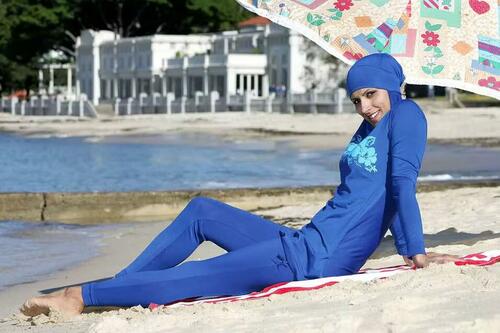
There is a controversial decision out of a French administrative court this week to suspend a policy allowing for Muslim women to wear “burkinis” in municipal pools in the city of Grenoble.
The court ruled that such policies “undermin[ed] secularism.”
While a long advocate of the separation of church and state, I have opposed these bans on burkas and burkinis as inimical to religious rights. France has Europe’s largest Muslim population and devout Muslim women can only use the pools with such coverings under Islamic teachings. France also has a long and proud history of supporting women in making their own choices — the very essence of Joan of Arc who followed her own religious dictates to heroic ends. This is a denial of such self-determination and self-expression for French Muslim women.
The ruling is reportedly based on a 2021 “separatism” law passed in President Emmanuel Macron’s first term, which allows the suspension of measures that would “undermine secularism and the neutrality of public services.”
Interior Minister Gerald Darmanin publicly supported his ministry filing an objection against the burkini policy in Grenoble. He announced that “The administrative court considers that the mayor of Grenoble, with his decision allowing burkinis in municipal pools, is seriously undermining secularism.”
Many opposed the proposal by Mayor Eric Piolle and conservative leader Marine Le Pen declared that she wants to introduce a law banning burkinis in municipal pools.
The ban undermines free speech and associational rights as well as the free exercise of religion. Many people find such coverings sexist and offensive. However, this is a long-established matter of religious faith within the Islamic community. I fail to see how this harms others or society as a whole. French society can remain neutral and secular by neither opposing nor endorsing such clothing choices. If France supports the right of women to make their own choices in society, that freedom should include the right to choose to follow a devout religious lifestyle.
Joan of Arc famously declared “I was in my thirteenth year when I heard a voice from God to help me govern my conduct. And the first time I was very much afraid.”
While she wore armor rather than a burkini, the same religious imperative dictated her actions and she is now celebrated as martyr for France.
Whatever harm is perceived from burkinis, it pales in comparison to the harm from banning such swimwear in a nation committed to the freedoms of religion, expression, and association.
There is a controversial decision out of a French administrative court this week to suspend a policy allowing for Muslim women to wear “burkinis” in municipal pools in the city of Grenoble.
The court ruled that such policies “undermin[ed] secularism.”
While a long advocate of the separation of church and state, I have opposed these bans on burkas and burkinis as inimical to religious rights. France has Europe’s largest Muslim population and devout Muslim women can only use the pools with such coverings under Islamic teachings. France also has a long and proud history of supporting women in making their own choices — the very essence of Joan of Arc who followed her own religious dictates to heroic ends. This is a denial of such self-determination and self-expression for French Muslim women.
The ruling is reportedly based on a 2021 “separatism” law passed in President Emmanuel Macron’s first term, which allows the suspension of measures that would “undermine secularism and the neutrality of public services.”
Interior Minister Gerald Darmanin publicly supported his ministry filing an objection against the burkini policy in Grenoble. He announced that “The administrative court considers that the mayor of Grenoble, with his decision allowing burkinis in municipal pools, is seriously undermining secularism.”
Many opposed the proposal by Mayor Eric Piolle and conservative leader Marine Le Pen declared that she wants to introduce a law banning burkinis in municipal pools.
The ban undermines free speech and associational rights as well as the free exercise of religion. Many people find such coverings sexist and offensive. However, this is a long-established matter of religious faith within the Islamic community. I fail to see how this harms others or society as a whole. French society can remain neutral and secular by neither opposing nor endorsing such clothing choices. If France supports the right of women to make their own choices in society, that freedom should include the right to choose to follow a devout religious lifestyle.
Joan of Arc famously declared “I was in my thirteenth year when I heard a voice from God to help me govern my conduct. And the first time I was very much afraid.”
While she wore armor rather than a burkini, the same religious imperative dictated her actions and she is now celebrated as martyr for France.
Whatever harm is perceived from burkinis, it pales in comparison to the harm from banning such swimwear in a nation committed to the freedoms of religion, expression, and association.








